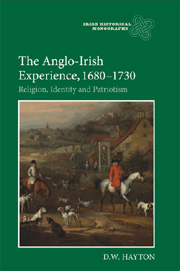Book contents
- Frontmatter
- Contents
- List of Illustrations
- Acknowledgments
- Abbreviations
- Preface
- Note on dates and quotations
- 1 From barbarian to burlesque: the changing stereotype of the Irish
- 2 Anglo-Irish attitudes: shifting perceptions of national identity
- 3 Aristocratic decline: the fall of the house of Ormond
- 4 A presence in the country: the Brodricks and their ‘interest’
- 5 ‘Commonwealthman’, unionist and king's servant: Henry Maxwell and the Whig imperative
- 6 ‘Paltry underlings of state’? The character and aspirations of the ‘Castle’ party, 1715–32
- 7 Creating industrious Protestants: charity schools and the enterprise of religious and social reformation
- 8 A question of upbringing: Thomas Prior, Sir John Rawdon, 3rd Bt, and the mentality and ideology of ‘improvement’
- Bibliography of secondary works
- Index
7 - Creating industrious Protestants: charity schools and the enterprise of religious and social reformation
Published online by Cambridge University Press: 05 February 2013
- Frontmatter
- Contents
- List of Illustrations
- Acknowledgments
- Abbreviations
- Preface
- Note on dates and quotations
- 1 From barbarian to burlesque: the changing stereotype of the Irish
- 2 Anglo-Irish attitudes: shifting perceptions of national identity
- 3 Aristocratic decline: the fall of the house of Ormond
- 4 A presence in the country: the Brodricks and their ‘interest’
- 5 ‘Commonwealthman’, unionist and king's servant: Henry Maxwell and the Whig imperative
- 6 ‘Paltry underlings of state’? The character and aspirations of the ‘Castle’ party, 1715–32
- 7 Creating industrious Protestants: charity schools and the enterprise of religious and social reformation
- 8 A question of upbringing: Thomas Prior, Sir John Rawdon, 3rd Bt, and the mentality and ideology of ‘improvement’
- Bibliography of secondary works
- Index
Summary
Of the many questions that might be asked about the course of the Protestant Reformation in early modern Ireland, one of the most popular, and in the long run probably the most important, is also the simplest: why, over several centuries, did proponents of the reformed religion not win over the hearts and minds of a majority of Irish men and women? Was it a failure of means, or of will, on the part of the reformers? Indeed, can it be properly described as a failure at all? For historians of the sixteenth and early seventeenth centuries, these have been matters of vigorous debate. Little consideration has been given, however, to the most promising of the opportunities missed by the established church, that brief dawn in the aftermath of the Glorious Revolution when the Catholic political interest in Ireland lay broken and, to all intents and purposes, impotent. Surveying the prostration of their enemies, and secure in their own power, some Protestant politicians and churchmen confidently predicted the fatal decline of popery on the island. Yet, despite the enactment of a succession of statutes to restrict or banish Catholic parish clergy and religious, and to encourage conversion, popery did not wither but survived to flourish again.
Once upon a time, conventional wisdom explained this disappointment in terms of Protestant complacency and weakness: an Irish parliament of hard-faced landowners was cynically contriving penal laws with the entirely secular aim of preserving their own monopoly of property and power; a Church of Ireland establishment, materially poor and spiritually torpid, was unable and unwilling to rise above the mundane.
- Type
- Chapter
- Information
- The Anglo-Irish Experience, 1680-1730Religion, Identity and Patriotism, pp. 149 - 174Publisher: Boydell & BrewerPrint publication year: 2012



